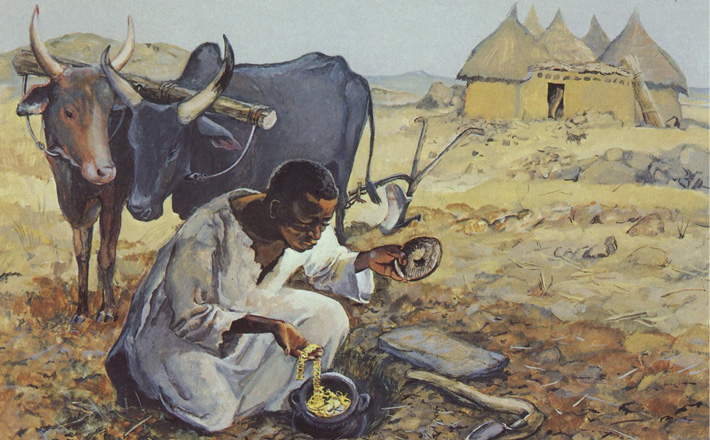Commentary on Matthew 13:31-33, 44-52
When describing abstract concepts, we often employ similes and metaphors.
How would you describe the wind or love? One could say the wind is like a feather’s touch or love is a journey. These literary devices are effective ways for giving color, life, and meaning to concepts that would otherwise be difficult to understand.
However, the tools are only effective if the person who hears them understands the references used. If I have never felt the touch of a feather I cannot know how the wind felt. Likewise, if I have never been on a journey, the comparison doesn’t help me better understand love. While the descriptions get us closer to the meaning, it is not the same as experiencing it. Specifically, it is the difference between knowing about something and actually knowing something. In this text, Jesus compares the kingdom of heaven to several concepts in order to enhance the crowd’s understanding of his teaching.
Jesus ends his teaching unit in Matthew 13 by creating a more descriptive explanation of the kingdom of heaven. He explains it in five brief parables. After two detailed parables about the sower and seed and weeds, it is as if someone said to Jesus: “Tell us more about the kingdom of heaven? How would you describe it”? Jesus concludes his message to the crowd by saying the kingdom of heaven is like: a mustard seed, yeast, hidden treasure, a merchant who searches for and finds fine pearls, and finally a net. Each of these short descriptions expands our understanding of God’s kingdom.
A mustard seed — size really doesn’t matter
The “smallest of all seeds,” the mustard seed grows into a tree (Matthew 13:32). Emphasizing the size of the seed may refer to the modest beginning of the kingdom of heaven being realized on earth. Jesus marks the commencement of this era; he may be signifying to the crowd that from these very modest beginnings, great things will come. The next mention of the mustard seed in the gospel can be found in 17:20 where Jesus tells his disciples that the faith of a mustard seed can move mountains. Again, what is seemingly invisible can have an overwhelming impact. Like the seeds mentioned in the previous parables, the mustard seed, too, will produce a yield.
Yeast — transformed to rise above
Jesus compares the kingdom of heaven to yeast. When yeast is added to flour it causes the flour to rise. Yeast is a key ingredient for making bread because without it, bread cannot be fluffy and light. In other words, the kingdom of heaven is transformative and uplifting. Without God’s reign, life would be flat and dull. It is the presence of God’s kingdom that empowers God’s people to rise above life’s circumstances.
Hidden Treasure — joy unspeakable
The kingdom of heaven is like hidden treasure that has been found because it brings joy. In the parable Jesus speaks of a man who, “…in his joy he goes and sells all that he has and buys the field” (13:44). The man that Jesus describes is so filled with joy that he risks it all to obtain more. In exchange for the possibility of finding more treasure, and thusly joy, he sells it all! As such, the kingdom of heaven is not simply joy; it is a joy that is worth all that you have.
A Merchant — a valuable treasure
The next parable teaches about a merchant who is searching for a pearl. Jesus states, “…on finding one pearl of great value, he went and sold all that he had and bought it” (Matthew 13:46). Like the man who finds a hidden treasure, the merchant who is searching for a pearl sells all that he has to purchase it. Jesus teaches that the kingdom of heaven is a treasure; it is valuable and something to be valued. Also, Jesus seems to underscore that the kingdom of heaven must be sought. It is not easily obtained or readily available.
A Net — all-inclusive
In the final comparison, Jesus says the kingdom of heaven is like a net. The net “caught fish of every kind, when it was full they drew it ashore, sat down, and put the good into baskets but threw out the bad” (Matthew 13:47-48). As in the parable of the weeds, Jesus describes the kingdom of heaven as diverse and inclusive. Again, the angels come to “separate the evil from the righteous” (13:49). However, the net contained various kinds of fish. Just as the fish exist together in the sea, we also must live together, exist peaceably, and leave the judgment to God.
The Scribe
There is one additional aspect of the kingdom of heaven that Jesus highlights and that is the role of the scribe. He concludes, “Therefore every scribe trained for the kingdom of heaven is like a master of a household who brings out of his treasure what is new and what is old” (Matthew 13:52).
Scribes are often portrayed in a negative light in this gospel alongside the Pharisees and the Sadducees. Yet, the role of the scribes was extremely important. They had authority over the law. They were trained, in this case, specifically for the kingdom of God. These scribes are leaders who are responsible for mining the wisdom of the law, both the old and the new, and teaching it to the people. In a modern context, the scribes would be those who have been trained in the gospel. Preachers out of the treasure of his or her knowledge of God’s kingdom must share the ancient context of the gospel (the old) and the contemporary application of it today (the new) with God’s people. In other words, those who are responsible for the law must make it relevant for God’s people today. Once again, Jesus’ focus on the crowd does not eclipse the training and preparation he provides for his disciples.
These five parables have taught us more about the kingdom of heaven. While the parables about the sower and seeds and the weeds may have appealed to the farmers in the crowd, these parables would have been meaningful to fishermen, bakers, and merchants. Their wide appeal would have helped the crowd to have a better understanding of the kingdom of heaven. We must seek the kingdom of heaven in order to find it and when we find it, we have found a treasure. This treasure will bring joy that empowers us to rise above life’s difficult circumstances. We experience the kingdom of God in community — all are welcome at the table. The more we are taught, by the trained scribes, the more we will grow and become witnesses of God’s kingdom here on earth.


July 30, 2017